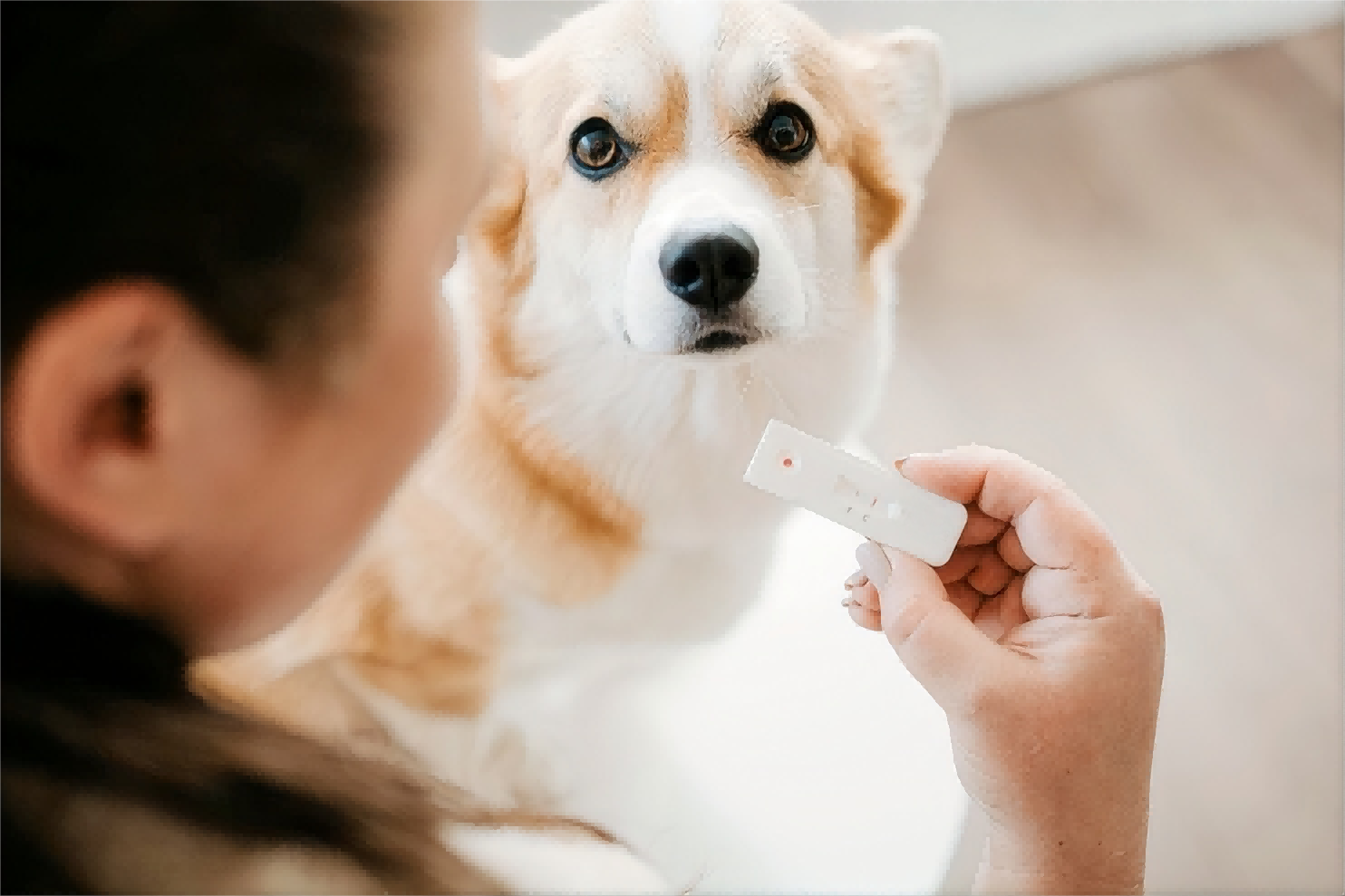
Pregnancy testing allows dog breeders and owners to accurately determine if their bitch is pregnant after breeding. While some physical signs can indicate pregnancy, diagnostic tests provide definite results and help plan for the upcoming litter. Canine pregnancy test kits evaluate biomarkers like relaxin and progesterone in the dog’s system. Let’s explore the different diagnostic testing options available, how they work, what they indicate, the costs, and how to accurately perform them at home for your breeding dogs.
DNA tests for determining parentage in dogs are very accurate when performed by reputable laboratories. The tests analyze genetic markers in the DNA of both parents and puppies to determine relative percentages of each parent’s contribution. With today’s technology, DNA tests can accurately identify the sire and dam of puppies with over 99% accuracy (Dreger et al., 2021). This allows breeders and owners certainty in verifying parentage when puppies are born, preventing doubts about stud dog accuracy or genetic mixing between litters.
In addition to diagnostic tests, some signs an owner can check for physical indicators of pregnancy in dogs include enlarged or swollen nipples, weight gain, increased appetite, and the eventual development of a mammary gland mass as gestation progresses. However, these signs do not appear until later in the pregnancy. Diagnostic testing allows for earlier confirmation within a few weeks of breeding rather than waiting over a month for physical changes. Ultrasound is another option but requires veterinary equipment and expertise beyond a home pregnancy test (Peterson et al., 2020).

Most canine pregnancy test kits examine levels of the hormone relaxin or progesterone in a urine or blood sample. Relaxin surges briefly around 5-9 days after ovulation and breeding in pregnant dogs. Progesterone steadily rises throughout pregnancy. The tests are immunoassays that detect these hormone levels, producing a coloured reaction if levels indicate pregnancy. Results are available within 10-15 minutes without needing a vet visit. This early confirmation allows breeders to plan whelping care and owner expectations.
While relaxin provides a very early detection, its levels fall off after 2 weeks. Progesterone provides a more reliable indicator throughout gestation since its levels remain elevated the entire pregnancy. Most veterinary clinics and professional home testing kits will monitor progesterone. This allows testing later than relaxin if the exact breeding date is unknown. Some dogs also naturally produce low relaxin levels whether pregnant or not, so progesterone gives more definitive results long-term.

The diagnostic tests for canine pregnancy are non-invasive and painless for the dog. They simply involve collecting urine or small blood samples, which most dogs tolerate well with little or no stress. The tests do not require needles or medical procedures. Owners can test calmly at home without veterinary involvement beyond obtaining the test kit itself.
Dogs will not typically exhibit fear related to pregnancy testing itself since it does not involve painful procedures. However, dogs can sense if their owner is nervous or anxious about the testing which may transfer fear responses. Owners should stay calm and treat the process casually to avoid stressing their dogs. Most dogs will readily provide urine samples with little or no coaxing if the owner is relaxed.
Have the testing kit and any needed sample collection materials like cups or swabs ready ahead of time. Make sure your dog has ample opportunity to urinate within an hour before the planned testing time. It may help to provide plenty of water before the test so your dog has a full bladder. Keep testing away from young children or other animals that could disrupt the process. Staying calm and acting casually will help reassure your dog.
Our company produces reliable canine pregnancy testing kits that are Veterinary immunofluorescence quantitative analyzer kits for both relaxin and progesterone detection. The progesterone kit (item MG-CA-R020) provides testing of 50μl samples within 15 minutes to monitor pregnancy status. These professional kits are used worldwide by breeders and veterinary clinics for accurate confirmation of pregnancies without needing an office visit.
A canine progesterone test measures the level of progesterone hormones in the bitch’s system. Elevated progesterone confirms the presence of corpora lutea, which form after ovulation during each oestrous cycle. If the bitch has mated and conceived, the corpus luteum persists longer than a non-pregnant cycle, keeping progesterone levels high as it supports early embryonic development. A positive progesterone test between 18-30 days after breeding confirms pregnancy in dogs.
This company’s Canine Progesterone (MG-CA-R020) kit costs around $55 and provides materials to test 10 samples. Given that breeding usually produces a single pregnancy, one kit would confirm or rule out pregnancy in a single-bred bitch. Additional samples could check for returning to estrus if initial testing was inconclusive or verify multiple breedings. The affordable per-test cost and convenience of home testing make this an efficient option for breeders and pet owners.
Some pet insurance policies aimed at breeding dogs may help cover routine reproductive health costs like pregnancy confirmation tests. Owners would need to check their policy terms to see if testing expenses or any veterinary diagnostic services are included. Basic health and accident plans usually do not cover breeding-related costs. The affordable cost of reliable home test kits makes self-pay an accessible option as well.
Yes, the progesterone kit is designed for convenient at-home use without requiring a vet visit. The instructions and materials provided allow any dog owner to collect and prepare a urine sample safely at home. The kit includes simple step-by-step directions to perform the immunoassay test and interpret results within 15 minutes. This professional-grade kit allows accurate confirmation without needing veterinary involvement beyond the initial purchase.
Like any diagnostic test, false results are possible but rare with a reliable progesterone kit used as directed. The main causes of inaccuracies include testing too early before progesterone is accurately elevated, using an inadequate or compromised sample, or not following directions properly. When utilized 17-30 days after the suspected breeding, the test accuracy approaches 100%. Re-testing a week later resolves any questionable early results. Overall, this progesterone test is considered the canine pregnancy confirmation gold standard for reliability when used correctly.
While rapid in-clinic tests exist for dogs, they have lower sensitivity compared to quantitative progesterone testing. Rapid tests rely on qualitative detection of relaxin, which disappears too quickly, or basic yes/no indicators of pregnancy status without confirming levels. Professional veterinary-grade progesterone immunoassays provide a quantitative measurement to precisely determine the threshold confirming a dog’s pregnant state versus normal cycles. The greater accuracy and reliability of quantitative progesterone kits make them preferred by professional breeders over domestic rapid tests.
Dreger, D. L., Sutherland, R. J., & Friesen, K. G. (2021). The accuracy of canine DNA tests: A review of methodologies and applications in breeding. Journal of Veterinary Diagnostics and Investigation, 33(3), 446-452.
Peterson, R. M., & Haines, D. M. (2020). Diagnostic imaging in veterinary reproductive medicine. Veterinary Clinics of North America: Small Animal Practice, 50(5), 1091-1104.